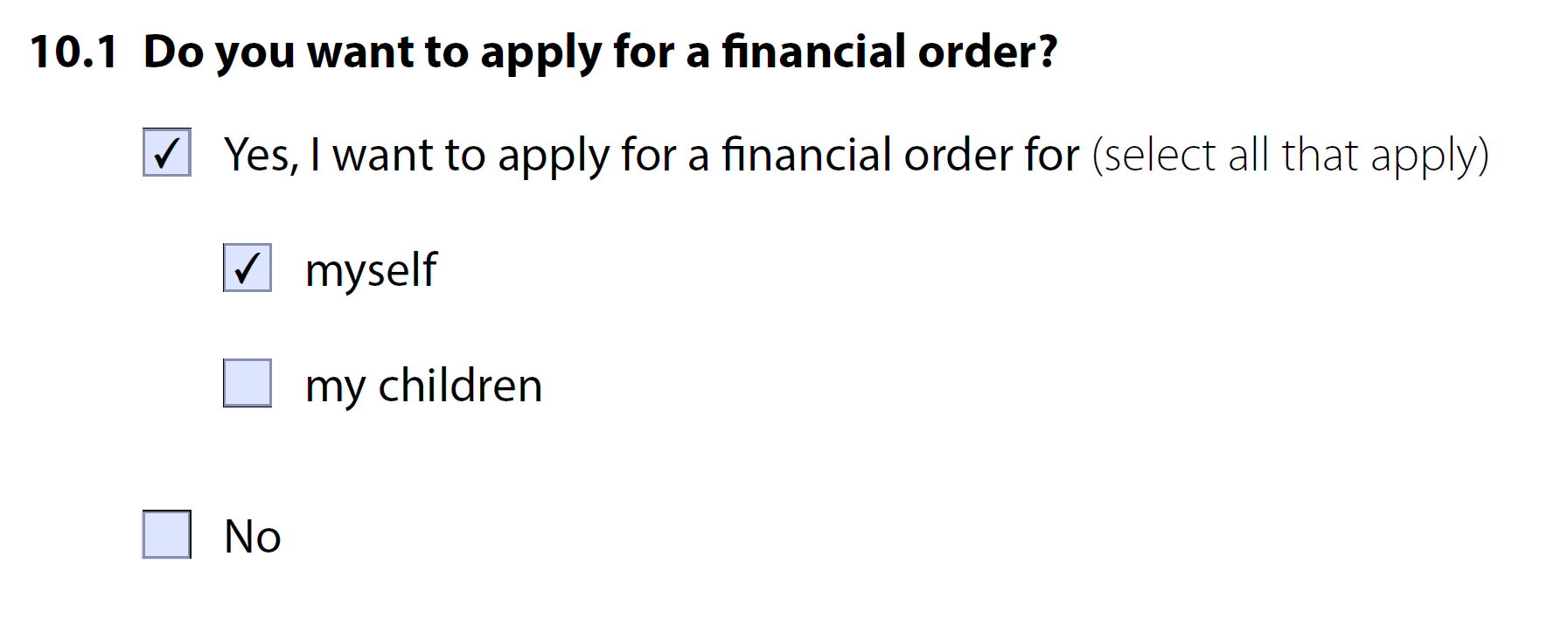Ticking the 'financial box' on my divorce application - what does it mean and should I tick yes or no?
This very common question creates a lot of confusion and panic, this blog aims to explain what it means and to help you understand if you should tick it or not. Before we delve into the nitty-gritty, for clarity, we are referring to the 'Do you want to apply for a financial order' question in the divorce/dissolution application.

1. "What happens if I tick 'yes' for either myself or/and my children too?"
This will not trigger any legal process or commit you to anything. In fact, it really doesn't do anything at this point. It just means that you have left the door open to sort out a consent order (the document that makes your financial split legally binding) in the future.
If you tick ‘yes’, most people with children will then tick ‘myself’ and ‘my children’.
2. "So, why would I tick 'yes'?"
At amicable, we generally advise that it is a good idea to tick 'yes' as it means you've already started the financial proceedings in the eyes of the courts. This is important as it protects you if you remarry before your financial split has been made legally binding by the courts (which can take a while).
3. "What happens if I tick 'no'?"
Again, nothing will immediately trigger. However, if you are the applicant and have ticked 'no', you can still apply for a financial order in the future, but only before you remarry. After re-marriage, the only type of financial claim that you could make against the respondent would be in respect of their pension.
4. "Do I have to get a consent order/financial order if I tick 'yes'?"
No, it just means you can do so in the future if you want to.
5. "Is there anything else I should be aware of?"
If you have ticked the 'maintenance pending suit' box then this falls outside of the rules above as the courts may contact you to ask if you want to request a hearing.
You should also bear in mind that you or your ex-partner will have to make a separate application to the court for your consent order – and pay the relevant fee. The court won’t chase you for an application if you don’t make one.
Finally, if you’re making a sole application, it might be worth letting your ex-partner know how you’ve responded to this question so they are aware and aren’t surprised when they're notified by the courts.
If you have any questions about the above or have any other questions about the divorce process in England and Wales, or if would like some support with your divorce application, please book a free 15-minute call with one of our experts here.
Read More
-1.webp)
Divorce can be an emotionally challenging process with significant legal and financial consequences. Knowing when to divide any money, property and other assets/debts, as well as the legal mechanism for doing this, can be confusing.
-1.webp)
Yes, but there are many reasons why you should consider getting one. In this blog, we’ll explore what a consent order is, why they are a good idea and the best time to get one.
.webp)
A consent order is a legally binding document that documents your financial agreement during or after a divorce or dissolution.

Start your amicable divorce journey
Speak to an amicable Divorce Specialist to understand your options and next steps for untying the knot, amicably.
Your guide to a kinder divorce
What if divorce didn’t have to be a battle?
In amicable divorce, Kate Daly offers compassionate, practical guidance to help you separate in a kinder, better way. Whether you’re just beginning, working through the practicalities or adjusting to co-parenting, this book meets you exactly where you are - and helps you move forward with confidence.
Pre-order on Amazon today






Comments (1)
Hi there. If I have ticked 'no', does this mean I cannot get a consent order? How can I amend an application to change this to a 'yes'?